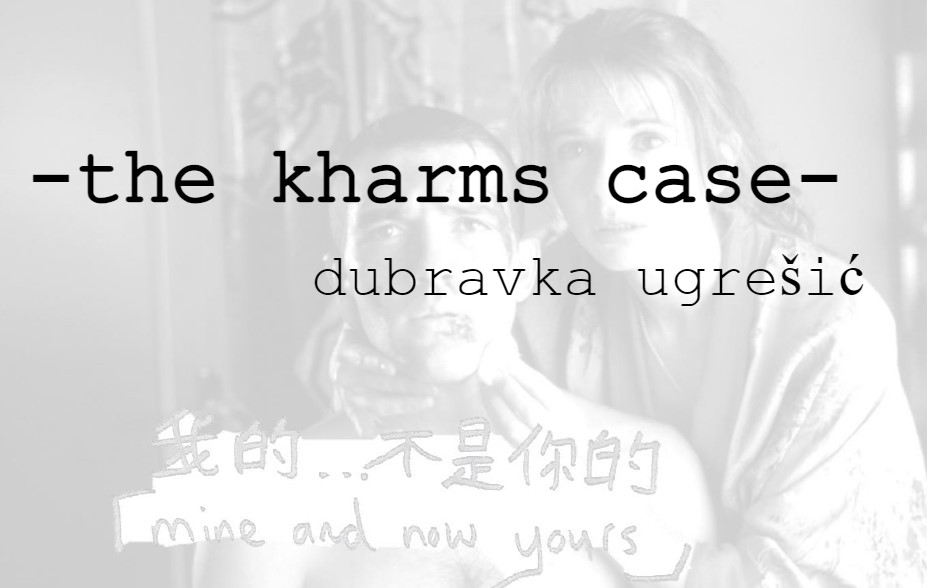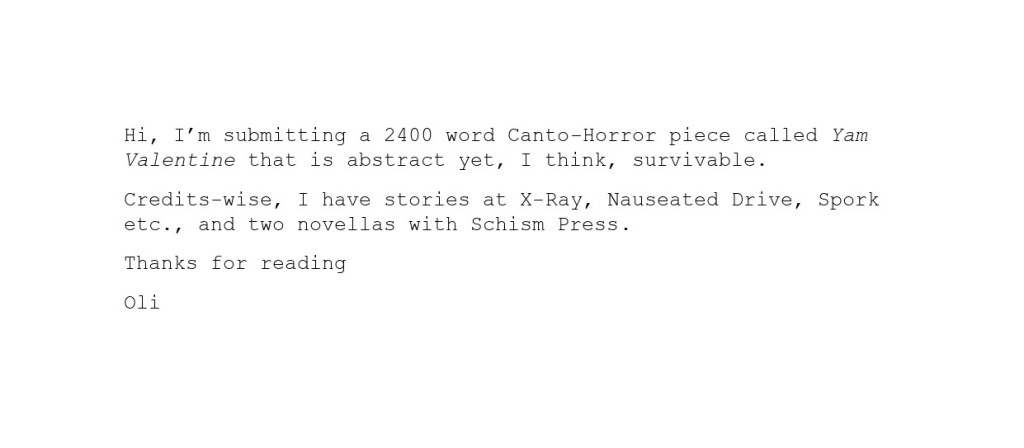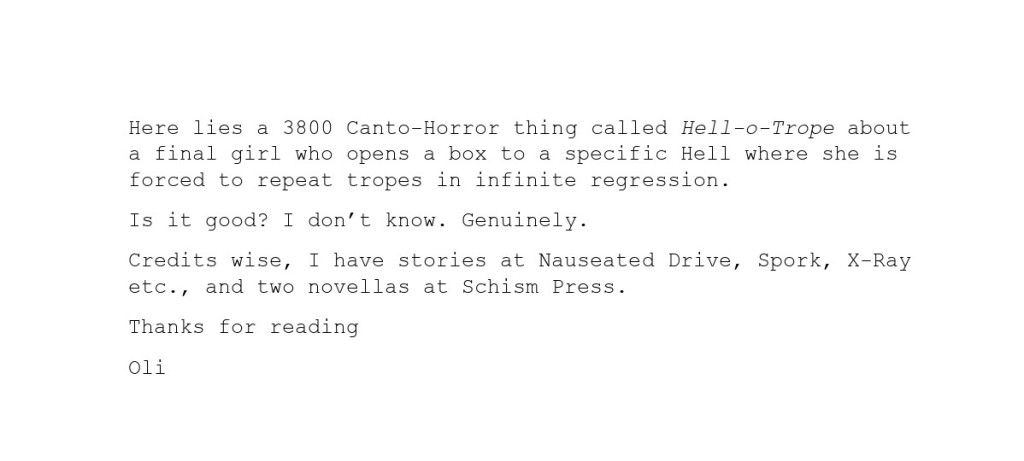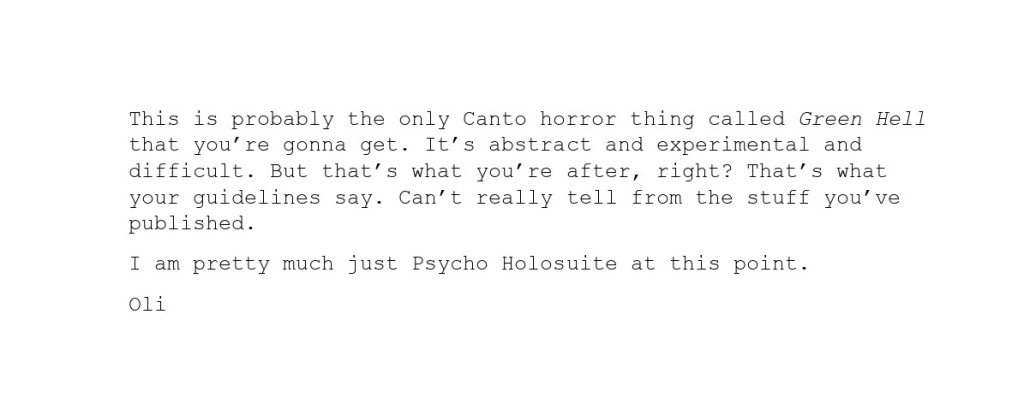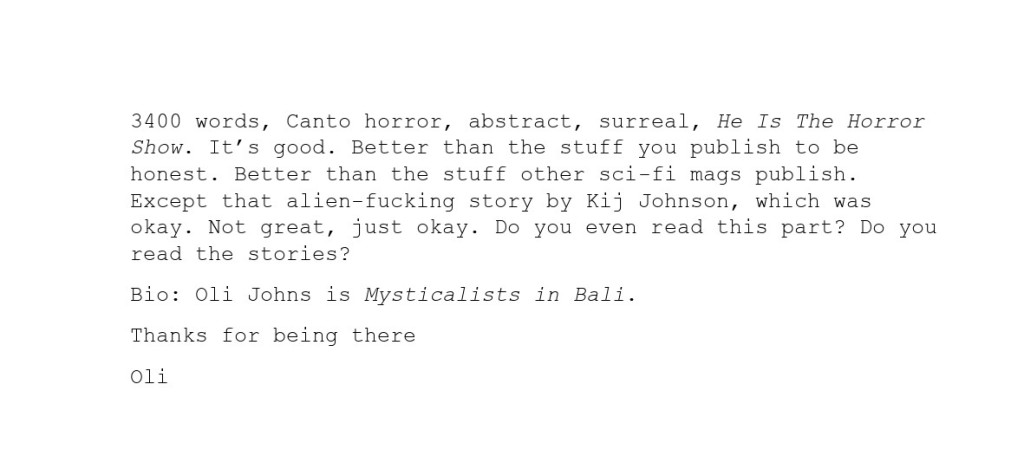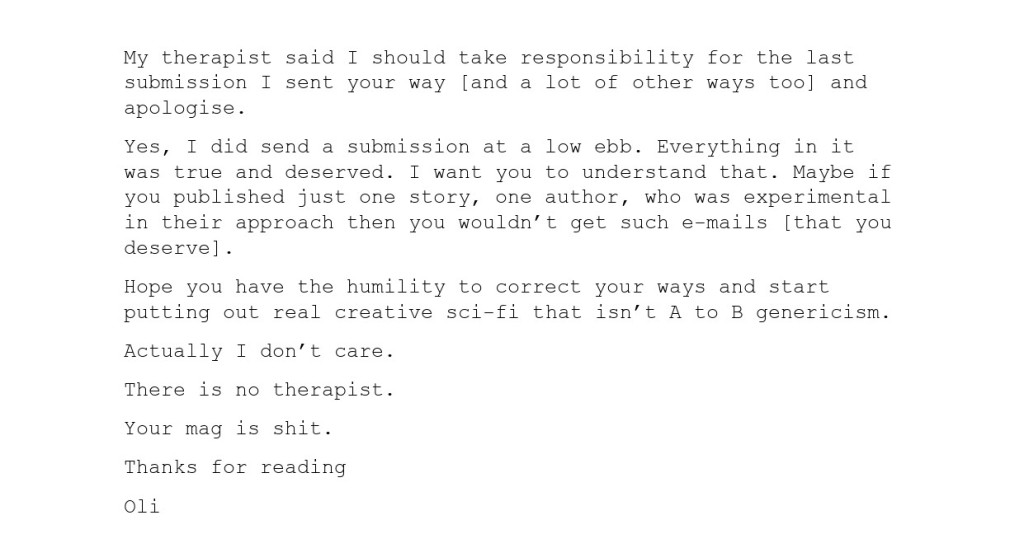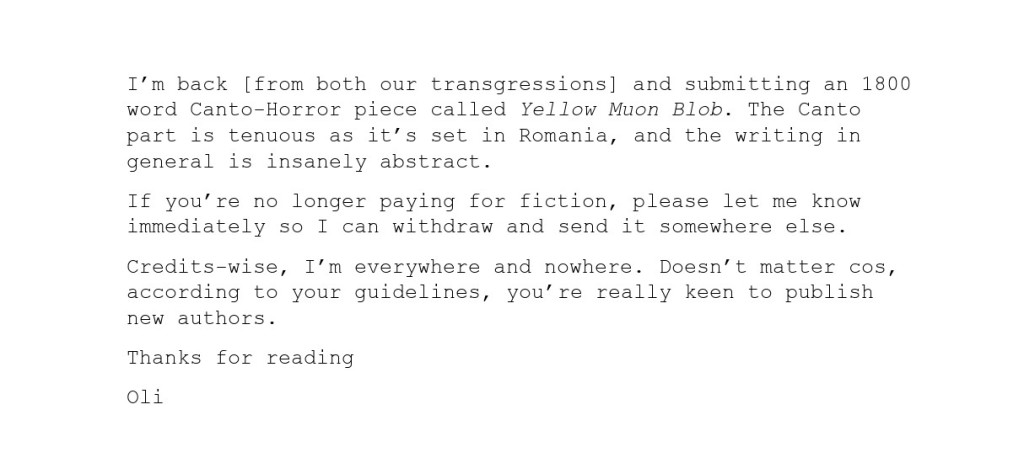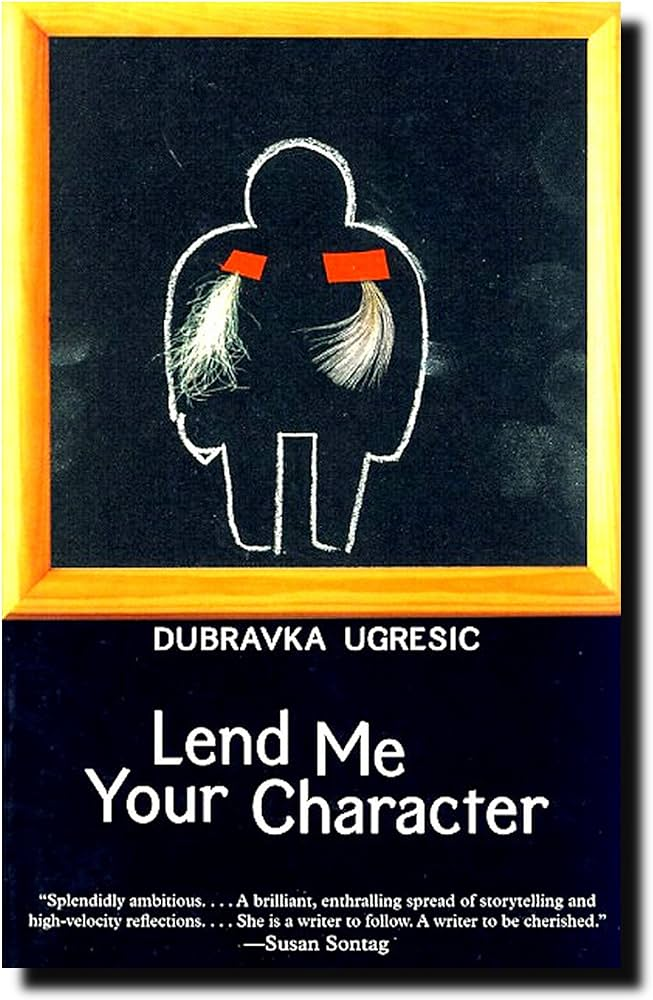+++
Text: The Kharms Case
Author: Dubravka Ugrešić
Publisher: Dalkey Archive Press
Plot: A Daniil Kharms stan writes endless letters to a publisher she supposedly admires, urging, cajoling, threatening him to publish HER translations of her favourite Russian author’s works.
Subplot: the world beyond letters is etherwave.
+++
‘Dear Mr. Tvrtković,
As I am most impressed by your publishing program, which displays surprisingly fresh and unconventional editorial taste, I am taking the liberty of offering you the work of a virtually unknown writer, equally unknown in his own country – in short, a writer as yet to be discovered. I am speaking of the Russian writer Anna Akhmatova Daniil Ivanovic Kharms [1905-1942].’
+++
This isn’t a novel or a novella but a novelette [maybe, haven’t counted the words] tucked in near the end of a collection called Lend Me Your Character.
I don’t think it’s the most famous of Ugrešić’s stories.
It’s ostensibly about translation [yet not], which is why I honed in on it. I’ve been looking to do something on Ugrešić for a long time, ever since I took out Fording the Stream of Consciousness twelve or thirteen years ago. Then, a few years after that, there was The Culture of Lies, a non-fiction book of Dubravka talking about Balkan politics and her exile from Croatia.
I didn’t read all of those books, just skimmed a few chapters.
She writes soft-surrealism well, Ugrešić.
Or Ugresic as this book calls her.
Typo?
Or two typos?
I’ve gone and checked the whole book and it’s consistently misspelt that way, Ugresic instead of Ugrešić. Apart from on the copyright page where it’s the original Croatian. Was that an intentional act by Ugrešić herself?
I don’t know.
The list of also-published books by the publisher at the back has other Balkan/Czech authors with the names spelt correctly [Danilo Kiš, Jiří Gruša] so perhaps it was done at the request of the author.
Or maybe it’s common practice for Croatian writers in translation?
I have no idea, just seemed a bit odd, and anything odd that catches my attention goes in here no matter how meaningless it might seem.
+++
+++
Who is Dubravka Ugrešić?
For some reason, she has my mum vibes. Could be the picture of her taken from ten years ago or the themes she writes about in her work. My mum is not a translator, but she does speak intermediate French. Or claims to. I’ve never actually tested her.
Ugrešić spoke Russian, English and probably a lot of other languages too.
I use spoke cos, sadly, she died last year.
Sadly cos it’s always sad when a nostalgic anchor point in your own life passes away. Nog and Odo from DS9 died a few year back and affected for me about a week. Same with the crew from Blake’s 7. Don’t know what I’m gonna do when Michael Dorn goes. Or Nana Visitor. Or Ensign Kellogg.
Death is a vicious hologram.
I still have The Kharms Case as an encapsulation of Ugrešić’s thoughts via malleable chess piece, a chess piece that may be her to some degree, but how much exactly?
+++
A biographical sketch:
Ugrešić was a Croatian dissident during the Balkans War, a surrealist, a magic realist, a translator of Russian literature.
She wrote [in The Culture of Lies and other books] about the trauma and exhilarating freedom of living in exile. She was the citizen of a ruin. A post-Yugoslav transnational or just a regular transnational?
A citizen of the world?
End sketch.
+++
I’m not sure if the following quote is from Ugrešić or Daniil Kharms, but it sums up a lot of what I do on Psycho Holosuite, gives permission for me to do it even.
‘Great literary pieces have that specific magical quality of provoking readers to rewrite them, to make a new literary project out of them.’
In the spirit of my Trash F-Log series, terrible cinematic projects have that specific magical quality too. I think even more so as there’s no pressure to live up to anything. Who’s gonna accuse me of ruining Cybernator or Blood Shack?
Hmm.
I double-checked and the quote seems to be from Ugrešić herself. As a reason to dig up Kharms, talk to him via her own thoughts.
Interrogate him.
Interrogate herself and her fascination.
Her pathology?
+++
Who is Daniil Kharms?
When I started reading The Kharms Case, I thought I had no idea, but then I remembered a bookshop long ago in London, possibly Foyles, and a small book of surrealistic nonsense with an introduction that said the author of the work was tired of writing sense and felt the only way to really discover something new was to produce the opposite [nonsense].
Not sure if he segued into Zaum or Asemic writing or the art world, I should probably check. Or perhaps I don’t need to as the letter that opens The Kharms Case delineates the background of Kharms in quite a lot of detail.
I forgot to add, this novelette is 100% epistolatory.
And one-sided.
As in the recipient of these letters, Mr. Tvrtković, the prospective publisher of our MC’s translations, never writes back.
Basically, we have to figure out the responses via implications or hints in the following letters, or the time gaps between the letters.
That’s no problem, I like this kind of writing.
Though there is the issue of balance/ratio. E.g. how obvious do the implications have to become in order to tell the reader what the publisher’s reaction was, and would the MC actually write that?
That last part is another interesting point, which I will come back to later. If I remember that I wrote this line. Doesn’t matter. I’ll probably come back to it by accident. Or on accident as I think Americans say. Do they? The guy I watch play Mario Maker on YouTube uses on accident and he’s American.
Either one is fine, I don’t care.
+++
‘Daniil Kharms, poet and playwright, is concerned less with the static figure than with the collision of a series of objects and their mutual relations.’
The MC, Vavka Ušić, eschews her own history in the first letter, instead running through a short biography of her idol, dead Russian surrealist Daniil Kharms.
Here she fits in a description from the manifesto of Kharms avant-garde collective ‘Oberiu.’
Written by Kharms himself?
It is not clear. And this becomes a theme throughout, a sense of distance, or the cloning of something distant/gone, that is accepted as authentic despite its removal from the origin point. But then also inauthentic as the MC’s paranoia grows and she starts to see copies of Kharms work everywhere until the inevitable happens and she doubts the authenticity of the work she has translated itself.
Is it distant when the MC is clinging to it so tightly?
That’s a good question [that I’ve just asked myself]. Kharms is long dead yet his work at the time of writing [1978-89] was largely unknown, even in the USSR. That lack of being known creates a crib for the MC to lay the work down in, to think of it as a close thing and nurture/feed off accordingly.
The author [Kharms] is distant yet his work is intimate.
It speaks to her, has spoken to her.
Ugrešić was also a translator of Kharms in real life and this novelette could be an attempt to analyse that. To analyse her relation to his art. It must be. Why else would she write it as a one way dialogue, to a publisher who seemingly doesn’t give a shit?
But then you have the question: how much of the MC is her and how honest is she willing to be? And how much can be hidden or disguised through the excuse of character and form?
Example: when the publisher doesn’t respond, she gets angry, but couches that anger in a Kharms anecdote, as if saying, this isn’t me being angry but me analysing a scene in the work of Kharms where his narrator becomes angry.
That is the character’s excuse.
The form is just the main conceit of letters to an academic publisher. Which dilutes the autofiction aspects as it is a mediated form. A secondarily mediated form, beyond the act of Ugrešić writing the novelette herself.
Autofiction = mediated to one degree
Epistolatory = mediated to two degrees [unless you’re writing to yourself?]
I’ll come back to this when we’re deeper in.
Haven’t even got past the first letter yet.
+++
+++
From the description of Kharms and his work with the Oberiu collective, it seems that he’s an ally to the Russian Futurist movement, keeping history fixed as a classical stamp while it burrows ahead into…surrealism? Post-structuralism?
His, or the author’s, reference to ‘a collision of a series of objects and their mutual relations’ could be linked to rhizomes and de-territorialisation. Though that might be a bit of a stretch as the quote is more atomic than quantum, a collision of objects instead of a remoulding or breakdown of the objects themselves.
Veering too close to philosophy, the deepest of deep ends, gonna pull back.
Why is the MC [and Ugrešić] so fixated on Kharms?
In the first letter, she claims that his short, absurdist, blackly-humorous prose is a match with the modern reader [of 1980].
Would that be the modern Croatian reader [of 1980]?
Or the Post-Yugoslav trans-nationalist reader?
Maybe not the last one as The Kharms Case was published in 1987 when Yugoslavia was still a country.
Surrealism is in a sense timeless.
You can escape into nonsense or abstraction in any era.
It is not escape.
It is a coping mechanism.
A joy.
You can express a lot in a collage reaction to House II.
Was Ugrešić escaping?
I don’t know.
Kharms lived through the early years of the Soviet Union, was called a traitor for not writing about proletarian reality. Called a traitor by non-proletarian tyrants. Why wouldn’t the working class be interested in nonsense, or surrealism? Isn’t that the aim, to make nonsense accessible to everyone? To appreciate the individual, the particular within a communal collective?
Ugrešić lived through the disintegration of the Yugoslav state. She seemed to both love and regret it. On some level, it was the destruction of her childhood, the elimination of the work she published during that time. Why was her response soft-surrealism?
Her background is different from Kharms, she was published within the belly of a Socialist State, whereas he was punished, sent to prison, reduced to writing children’s works.
Obviously, different states functioned in different ways in different eras e.g. Tarkovsky managed just fine in 1970’s USSR.
But Ugrešić…attached to Kharms…why?
Why him?
+++
As I said earlier, the time gaps between the letters in this novelette are important. They help to chart [implicitly] the psychological oscillations of the MC.
Or the narrator.
MC sounds too commercial, and that’s not what this is.
Not what it wants to be?
In the second letter, the narrator lets the publisher know that she has given some of her translated Kharms stories to a couple of literary magazines – as advance publicity, she calls it, even though her actual manuscript has yet to be accepted.
Did she translate Kharms’ entire bibliography?
It’s clear this is an obsession for the narrator as she also goes on to talk about a dream she had of herself observing Kharms in Leningrad, sitting by a window not reading a copy of Knut Hamsun’s Mysteries.
That book again.
I mention it once and then it pops up everywhere.
Is it a clue to the narrator’s psychology?
The character of Nagel in Mysteries is inscrutable, unreliable, and will tell people that to their face, which is what the narrator is doing here. She is telling the publisher about a random dream she had. There is no obvious purpose to doing this. The reality-etiquette agreement is already breaking down.
A collision of objects?
+++
+++
The third, fourth and fifth letters are each written roughly a year apart and show a rising level of frustration and threat.
The third letter = gentle rebuke
The fourth letter = a boast of other loving Kharms along with an implicit threat
The fifth letter = petulance/irritation/no apologies for previous implicit threat
‘24th February 1982
I received your message informing me that you are reading my translation of Kharms. Am I supposed to be grateful?!…’
I don’t want to assume too much, but I also do want to cos this is a one-sided epistolatory assault and there are three letters written over the course of two years, with a deteriorating tone, implying that the narrator life’s isn’t going so great.
We can assume that she has tried other publishers and they have rejected her.
We can assume that she is annoyed.
We can picture her yelling at the front page of her printed-out manuscript, at Kharms name, at the cover of Mysteries.
Pale green frogs are drawn all over her naked body.
Lovers are fleeting, and forced to read her manuscript.
Forced to answer to the name Tvrtković [the publisher].
She may beat them when they play this role.
Or worse.
Subtext?
Publishing/gatekeeping is a slog, with the publishers/gatekeepers infinitely reproduced. Shrieking alone about your genius then circling back to fuck, I’m delusional. Losing sense of your own taste as you MUST despise other writers who are getting somewhere, but some are good and you have to force yourself to admit it, or at least create a measuring system to sift the good from the mediocrity, which is everywhere. But then the measuring system becomes too kind, imbalanced, and you start going the other way, thinking everything you read is better than your own stuff, it has to be cos people are reading it, and your stuff suddenly lacks something that you never even intended it to have. There’s no character arc, they don’t evolve, the word choice is specific to your life alone and no other, what’s the point of all this?
To have someone look at you the same way Ugrešić looks at Kharms. The way modern writers look at Ugrešić. Assuming she doesn’t have any scandals I never heard about. Do modern writers look at her? Imitate her? Would they then be imitating Kharms, who may have been an imitation himself?
I don’t care.
Writing is ME.
I’m having a good time.
And I’m light years better than Ugrešić.
Better than Kharms too.
And Hamsun.
And Pyn-
+++
Ugrešić is okay.
Reigned in a little too much for my liking, but okay.
+++
What is my standard for okay?
+++
I [barely] remember one of my old books, Charcoal, and some guy on a writing site saying it was just a boring list of sentences circling a weirdo sociopath.
That was around 2008, I think.
+++
If I ever became a gatekeeper, would I be any different than the ones now?
Would I dismantle the gate, wander off into the wilderness?
+++
‘I had a strange dream: I was lying in bed and beside me [with a cap on his head] lay Daniil Kharms, smoking a pipe.’
The sixth letter retreats into whimsy/dreams.
As an alternative method of attack?
The narrator does not apologise for her previous [implicit] attacks, she re-costumes them, makes it intimate, almost sexual as, at the end of her dream, the Kharms figure in bed with her turns out not to be Kharms but the publisher.
This is a weird mix.
A seduction battle of ‘you may sleep with me if you publish my translations of Kharms’ vs ‘you are usurping my Kharms sex fantasy with your obstinance, be careful with that.’
+++
‘It is quite clear that I directed all my efforts over Kharms to the wrong person. I hope that you have the decency to return my manuscript.’
Letter number 7 states that others are succeeding in their attempts to publish her idol, with a biography about Kharms and several translated poems [not by her].
This provokes the response above, a pre-emptive rejection by the narrator.
Basically another threat.
Will this escalate into psychopathy?
+++
Another year passes before the narrator finally loses her shit.
Kharms’ short stories have been published in a rival collection and her life appears to be slipping backwards into a Kharms-less void all cos of a publisher who won’t respond except to say he’s reading her manuscript.
Is he though?
Maybe.
And if he is then he’s only enabling more of this harassment. Now she’s threatening legal action, and insulting him through the façade of listing curses Kharms used in his work.
She’s angry but is still cloaking it.
I don’t know.
Is this Ugrešić keeping to the form or hiding behind it so she doesn’t have to go too vulgar? If the narrator is an academic, a woman of words, then she wouldn’t insult him like she might her lover or a family member, she would use her intelligence to mask it, but then…would she? Doesn’t that dilute her anger a little?
I’m unsure on this one.
The choice can be justified on a character level. It works. Yet it also feels like a character limited to a certain type of surrealism, a type that can’t let itself fully sink into the gutter.
How about if the narrator did insult him, then explained that she was considering disguising it in a list of Kharms curses, and then insulted him again?
That way she could both play the reality-etiquette game and go beyond it.
Would it endanger her chance of getting published?
Probably.
But it’s Ugrešić that’s in control of that, isn’t it?
+++
+++
My points a few lines above are either redundant or more relevant than ever after the tenth letter, as it seems, bizarrely, that the narrator has assaulted the publisher in his own office.
As it was in the ninth letter, this shows an escalation that couldn’t be tempered by the cloaked insults she made.
But if the ninth letter had been written my way…it would’ve shown a more natural escalation from direct written insults.
Both ways are okay, I suppose.
And it doesn’t matter much cos the weirdest part is that the publisher is going to take on her manuscript now.
Violence works every time.
It’s funny, in the tenth letter, she apologises for the first time, yet also attempts to justify her rage as appropriate for the way she had been treated.
This is a very social media type of apology.
Sorry but I was right to try and slit your throat with a Nosferatu poster.
+++
I remember one time a hipster art café in Dalston threw some of my zines in the bin. I took them there, the staff said she needed to get the owner to read them first, make sure they were okay, so I left about ten or so zines behind. When I returned about a week later, they had mysteriously disappeared. Into the bin. I remember this cos last week I saw a writer on Ig talk about visiting this café – it’s still going strong, the bin incident was around 12 years ago – and how legendary it was. Legendary for throwing my zines in the bin, I thought.
Another café owner threw my zine towards the exit and that led to a brief scuffle that I exaggerated into a full blown fight in Castle Damijana for lying purposes.
No one ever apologises, not sincerely.
+++
The eleventh letter and the narrator is much more capricious and playful now, and also obscure as she communicates through anecdotes relating to Breton Kharms, not herself or her own life. She has no apparent life. The editor must think she’s a lunatic. He clearly doesn’t reply. Yet he is publishing her Kharms manuscript. A pure business decision cos it’s trendy?
There is also irony in the narrator criticising lit mags for publishing stuff that is either copying, aping or riffing on Kharms’ style.
This is psychologically sound.
She loathes that others are discovering HER Kharms but is also exhilarated.
HER little universe of Kharms is pulling in more people, which validates her obsession yet also dooms it, sullies it.
Of course, this is all from the perspective of a maniac.
Soft-surrealist maniac.
Kharms himself would’ve been accused of copying others too, Knut Hamsun, Breton, Maldoror etc.
+++
Someone said a long time ago that my auto-fic novel, Charcoal, was similar in style to the work of Jeff Noon.
I’ve never read him.
Only writer I’ve consciously copied or aped is Tyson Bley and that was for my beginning attempts at poetry. I could never go quite as random/deranged as he did though.
+++
+++
Lost track of the letter numbers now.
Most in the final fifteen pages seem to be a pedantic analysis of Kharms’ work, tiny, insignificant aspects of it.
The narrator is completely off the reservation.
She talks about Love and a Kharms story where an almost endless series of gay guys die in unrealistically novel ways.
‘Namely, it is striking how often Kharms mentions food, particularly porridge.’
Porridge = cum?
This letter could be the narrator struggling with the novelty and rejection of self-fantasy that Kharms being gay would engender.
Engender?
Provoke.
+++
Then there’s the experimental novelist story, a call to phenomenology, which is a term that always messes with my brain. I think it’s appropriate here. Hopefully.
‘Before I put anything on paper, I must experience the phenomenon I am describing.’
Experience strengthens the writing of the “real”.
Obviously.
Though some might feel self-conscious and reel it back, put up misty layers to hide the transgressive-beyond-transgressive parts. Or go the other way and oversaturate the “real” until it becomes a clown-simulacrum of its original face.
Both are possible.
The story within the story?
A tailor-novelist continually attempts and fails to commit suicide so as to accurately write about the experience of it.
Pedantic, specious…heavily ironic…yet also mistakes the “actioned-event” for the “psycho-impulse” or “psycho-mandate” of the event. You can get suicide details online now, if you wanted to. Everyone knows the blade goes lengthways not across. But to know the psychology, you have to be close to that space/intention yourself. You don’t have to do it, but you do need to desire the doing of it.
Not a problem for me fifteen years ago, but now that I’m so distant from that space/feeling…is that why I write about absurdism? As compensation for a loss of “real” phenomenology?
Or is surrealism/absurdism just a different infrastructure in which to house that suicidal intent?
+++
+++
‘6th January 1985
Mr. Tvrtković,
Leafing through Kharms again, I am struck for the first time by the fact that nowhere are there so many deaths as among the Oberiu.’
Does this woman read no other books?
She goes on to detail all the death statistics from the books of the Oberiu writers [including Kharms, obviously] even though she must know by now that the publisher, or editor, will not respond.
Why is she doing it?
A perverse need to tell someone about her obsession, to show them explicitly with esoteric breakdowns how she thinks of it.
It’s a good way to convey obsession by Ugrešić.
I like it.
I like the pedantry of details, the specificity of it all.
The aura of “real” threat.
+++
“Real” threat as a short solipsistic extract written by the narrator herself, which is the diary of a serial killer.
At the end, she says it is HER work inspired by Kharms, but it’s too late, the barrier has already been broken.
Menace climbing over the body of absurdism.
It’s funny, and a good use of contrast, in the next letter when she tells us [and him] that she visited his office and had the impression that he was avoiding her, yet, if that is the case, she can’t think why.
There is an obliviousness to this character that works. Maybe a bit obvious at times, but it does work. Cos everything is defensible via Kharms.
Send a letter that is 98% the thoughts of a serial killer written by the narrator herself, say it was just a little fun exercise inspired by Kharms, what’s the problem?
+++
The next letter is a bit of a shock, but perhaps inevitable – he’s been hospitalised, after an “accident” with the filing cabinet in his office.
And the narrator is telling us she was there.
Inevitable violence?
It’s unclear as we only have her side of the story and she is breathtakingly unreliable.
She either spooked him so much that he tripped and hurt himself, or she caused it to happen. There is mention of a hand wound that she later blames on the secretary [who was also present] and, of course, no apology for anything she may have been responsible for.
It is weird, at the beginning of the story, it seemed that she was writing to several publishers, but now it appears that this guy is the only one.
Because he said yes?
Did he say yes?
If he hadn’t, why would she still be harassing him like this?
+++
The beauty of a live-fluid character is that they can operate on several different levels, usually when forced to defend or promote themselves.
Aside from avoiding blame for the “accident”, the narrator spins off into superstition, with the fear that Kharms’ work might be cursed, then doubt that Kharms himself was actually a real person. She just isn’t sure if she feels him anymore.
Phenomenology again.
Mimicry.
Her proof: his work is easy to imitate as it’s primarily nonsense and now she’s not sure what it is that she has translated. Is it a symptom of guilt for causing the office accident? Does she fear Kharms being open to others outside herself?
There is comfort in being alone.
+++
The final few letters are either a psychotic break or the publisher diving into his own psycho-masochistic fantasies as the narrator tells us, and him, that they are in love.
It seems completely one way.
She calls him Mousey, which is a reference to the Kharms poem in an earlier letter that she said might be an imitation.
Don’t think they’re fucking as she refers to their eight years together, which is the length of time of the letters correspondence.
This is not a physical relationship.
Is she unravelling? Or is this a perverse kind of game that Kharms himself might indulge in? The imitation of what she has read was his life?
+++
No, they are fucking.
And living together.
Until she leaves him for a Kharms scholar called Lars.
What?
+++
‘We have lots in common, if that even matters in relationships.’
A very Kharmsian line, meaningless and insulting, a rebuttal to the reality of their year and half long relationship.
Is this all in her head?
I think it might be.
My gut says it is.
How could it not be?
+++
+++
Running out of energy.
Should be writing an unpublishable mess-novella called Locked Moon Your Vice Is The Key Witch but instead I’m sitting here, wondering where all the translation-related stuff is in this thing.
The narrator has no insight into the differences between Russian [Kharms] and Croatian [herself]? Perhaps there are no differences, in her mind. Only eddies of disappointment when she convinces herself it may all be a sham and Kharms is not as concrete as she thought he was. But then he is again. She needs him. The translation was done years ago.
+++
‘Life must be useless, like a gift.’
She shows no remorse whatsoever. Leaves the publisher to take care of all practical matters from the break up – her stuff in the apartment, bills etc.
A stark contradiction to her obsessions with Kharms over the last eight years, and possibly more years before that.
Is her own translation of Kharms just an imitation of his work, not an actual translation? Was the previous letter a confession?
Like Nagel in Mysteries, the book that is now everywhere I look, we only have her side of the story to operate within so we’ll never know.
+++
The Kharms Case is taken from the collection Lend Me Your Character which is available here.
